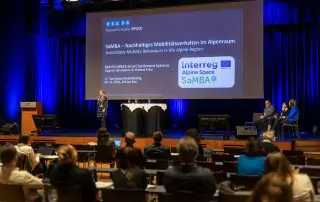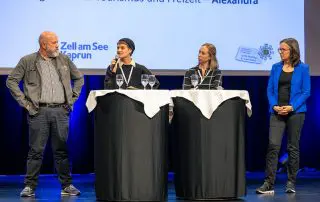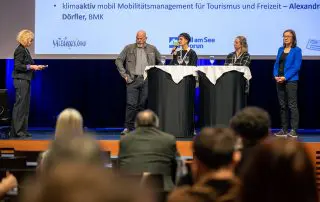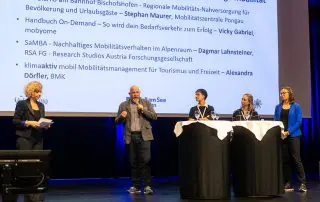The Tourism Mobility Day in Zell am See offered networking on possible solutions for sustainable mobility in tourism. Here, 150 experts exchanged views on opportunities and challenges in times of climate change. Dagmar Lahnsteiner from Studio iSPACE and the Ultimob, Airport 4.0, PRIMA and SaMBA projects were also present.
The Tourism Mobility Day, organised by the Federal Ministry of Labour and Economic Affairs (BMAW) and the Federal Ministry for Climate Protection (BMK), brought exciting examples of sustainable mobility solutions to the fore in Zell am See on the topic of ‘Sustainable mobility at every turn’. The forum offered the opportunity to exchange experiences and knowledge with around 150 experts on current topics from tourism, mobility, regions and climate protection.
Panel 3 ‘Support services for more sustainable mobility’ focussed on two Studio iSPACE projects: Dagmar Lahnsteiner presented Interreg SaMBA and Vicky Gabriel from project partner Mobyome presented PRIMA, among others.
The aim of the FFG research project PRIMA is to create a planning basis for integrated mobility services for on-demand transport that are specific to each spatial type. Spatial types for on-demand transport are defined on the basis of different characteristics in order to show where which services have a high potential to improve the existing public transport service as an economical and attractive solution. A municipality in the test area can be selected in the ‘success canvas’ and information is provided on the spatial type and the success factors that need to be considered.
SaMBA was an Interreg Alpine Space project and aims to promote sustainable mobility behaviour in the Alpine region. There are a number of measures that can encourage sustainable mobility behaviour. As part of the Interreg project, various initiatives and incentive systems were tested in nine pilot regions of the Alpine Space. In addition, tools were developed to spatially model the potential for sustainable mobility in a region with specific framework conditions and objectives, to identify areas for action and to find suitable measures and examples of implementation. These transferable and expandable tools can also support the demand-based planning of effective solutions in sustainable tourism and leisure mobility.
Furthermore, iSPACE-Researcher Dagmar Lahnsteiner presented the iSPACE-projects ULTIMOB and Flughafen 4.0 as further research results with a connection to sustainable tourism mobility.





